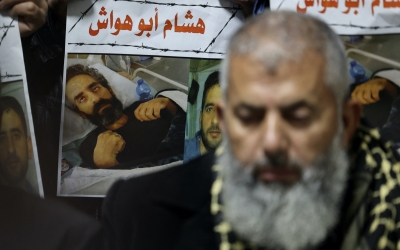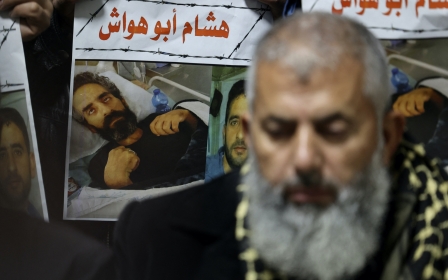Israel-Palestine: Hisham Abu Hawwash to end hunger strike after 141 days

A Palestinian prisoner who has been on hunger strike for 141 days to protest being imprisoned without charge agreed on Tuesday to end his fast after reaching a deal with Israel, according to his attorney.
Lawyer Khaled Mahajneh, part of the team representing Abu Hawwash, said that Israel had agreed not to renew his administrative detention and he will be released next month, the news website site Arabi 21 reported.
Citing another lawyer, Haaretz reported that Abu Hawwash was expected to remain in an Israeli hospital for medical follow-ups and would be released on 26 February.
A father of five, Abu Hawwash was arrested in October 2020 and faced a six-month administrative sentence, which was renewed. He launched a hunger strike in the summer against his arbitrary detention.
Israel froze the administrative detention sentence against Abu Hawwash this week, and he was moved from Ramleh prison to Shamir Medical Centre near Tel Aviv, where he remains incarcerated under heavy guard. He was admitted to the intensive care unit.
New MEE newsletter: Jerusalem Dispatch
Sign up to get the latest insights and analysis on Israel-Palestine, alongside Turkey Unpacked and other MEE newsletters
According to his brother, Abu Hawwash is extremely weak and can barely hear or speak, nor move his limbs.
Administrative detentions, a highly controversial policy used by Israel almost exclusively against Palestinians, allow detention without charge or trial for renewable periods of three to six months, without the possibility of appeal or of knowing what accusations are being levelled against the detainee.
Abu Hawwash's hunger strike – the longest since an eight-month-long strik by Samer Issawi that ended in 2013 – drew attention not only from Palestinian groups across the political spectrum but also from organisations and politicians globally.
In the United States, Congresswoman Rashida Tlaib said that the Israeli government "alone is responsible for this situation and his health and safety".
And on Monday, the European Union Delegation to the Palestinians (Dpal) said it was "seriously concerned" about the 40-year-old's life which was reported to be in "immediate danger".
"The use of administrative detention without formal charge remains a longstanding concern," Dpal said on Twitter.
"Detainees have the right to be informed about charges underlying any detention, must be given a fair trial within a reasonable time or be released," they added, calling for an urgent solution from Israeli authorities.
Many Palestinian prisoners have resorted to hunger strikes to protest against the policy.
There are almost 500 Palestinian prisoners in administrative detention in Israeli prisons, and they have decided to boycott hearings at Israeli military courts, calling for the policy to be abolished. Their boycott began on 1 January 2022.
Middle East Eye delivers independent and unrivalled coverage and analysis of the Middle East, North Africa and beyond. To learn more about republishing this content and the associated fees, please fill out this form. More about MEE can be found here.





